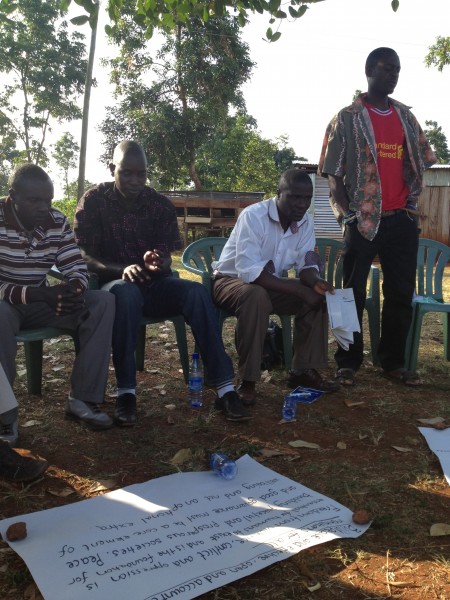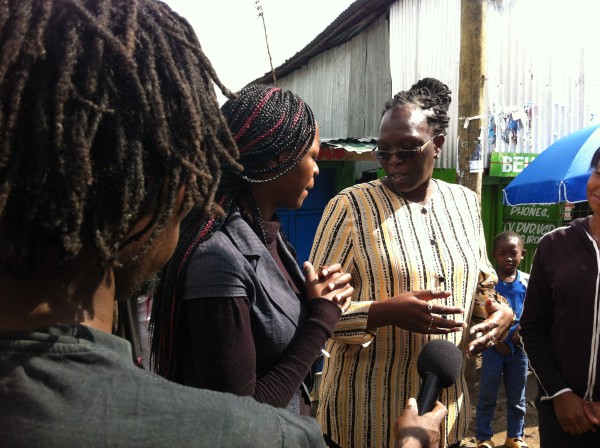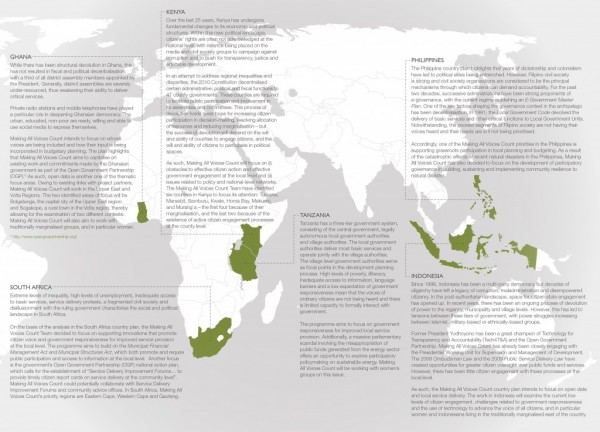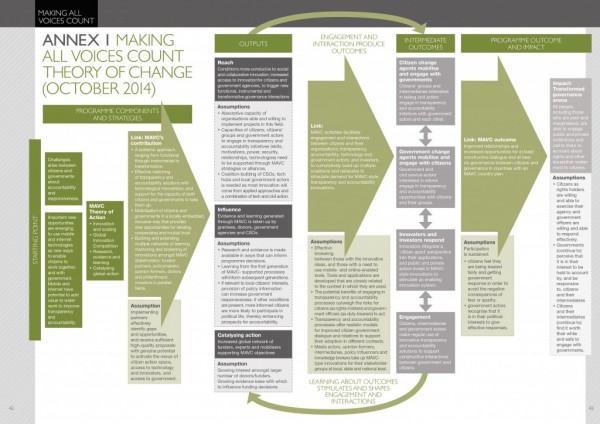A unique feature of Making All Voices Count is the inclusion of a Research, Evidence and Learning component – led by the Institute of Development Studies (IDS) – as an integral part of a mainly operational Programme.
This component offers an opportunity to build an evidence-base on what works (and what doesn’t work) in using technology for citizen voice, transparency and accountability.
In May 2015, we published our Research & Evidence Strategy which guides this area of the Programme’s work, and outlines the forms of support we can provide to actors working in this field, for research and evidence-building.
Here, we highlight some of the main features of the strategy and our priority research themes.

Community researchers exploring governance issues in Uganda. Photo credit: Restless Development/Participate.
The Research & Evidence strategy provides a brief overview of existing knowledge on citizen engagement, government accountability and responsiveness, technology for transparency and accountability, and of the roles that research, evidence and learning play in Making All Voices Count.
It outlines the Programme’s priority research themes and questions, and how these activities relate to our overall Theory of Change and to country plans in our six priority countries: Ghana, Indonesia, Kenya, Philippines, South Africa and Tanzania.
Making All Voices Count’s Theory of Change
Making All Voices Count arises from the recognition of a series of challenges that exist between citizens and governments around accountability and responsiveness, and emerging opportunities to use mobile and internet technologies to enable citizens to work together, and with governments, so their needs and fundamental rights are met.
Mobile and internet technologies have the potential to add value to wider approaches to improve transparency and accountability. Through investing various inputs (grants and other forms of support), Making All Voices Count aims to produce innovative solutions and influential evidence and learning about the use of technology for citizen voice, transparency and accountability, and to catalyse action on a global scale.

Community members present the findings of a geo-mapping project to a United Nations policy maker, where they identified broken street lights and crime hotspots in Mathare, Kenya. Photo credit: Spatial Collective/Participate
The Programme aims to ensure that as a result of our work, a range of actors, opinion-shapers and decision-makers will take up innovations, informed by our learning and evidence; citizens and change agents in society and in government will be mobilised to engage with each other; and innovators and investors will respond by developing approaches to further citizens’ interests.
These investments and interactions will lead to improved relationships and increased opportunities for constructive dialogue and a degree of co-governance between citizens and governments in the six focus countries. In turn, the Programme will contribute to supporting all people, including poor and marginalised people, to engage public and private institutions and call them to account over their rights and the issues that matter to them most.
Priority research themes
Based on the review of existing research and the our Theory of Change, the following overarching research themes and questions have been identified as priorities for Making All Voices Count to explore:
Learning from the first generation of transparency and accountability, citizen voice and government responsiveness initiatives
• Conceptual work to flesh out the theoretical and conceptual basis for understanding citizen-led accountability and accountable, responsive governance (whether tech-enabled or not) and shaping it in practice, to enhance effectiveness and impact.
Government responsiveness
• What makes government actors targeted by technology for transparency and accountability initiatives (Tech4TAIs) change their behaviour and act responsively?
• What makes a transparency and accountability ‘champion’?
• What kinds of citizen engagement lead to what kind of government responsiveness?
Exclusion and inclusion
• Who are ‘hard-to-reach’ potential users or currently non-users of Tech4TAIs?
• What successful experiences exist of reaching ‘hard-to-reach’ citizens in ways that have contributed to transformative change in their situations?
• Which social differences or exclusions are narrowed by technology, which are exacerbated, and which are unaffected?
Citizen engagement in a time of technology
• What is known so far from the ‘first generation’ of transparency and accountability initiatives (TAIs) that is relevant to tech-enabled transparency, accountability, voice and responsiveness work?
• What happens to citizen engagement and voice when it is aggregated, mediated or represented through technological innovations, questioning assumptions and exploring risks?
Scaling up, scaling down or scaling out?
• What is known about scaling as a transformative strategy, and how does it apply in this field?
• On what basis should decisions be taken to support the scaling of a tech innovation in the field of citizen voice and government responsiveness, and how should the most appropriate form and level of scaling be designed?
Next Steps
Making All Voices Count facilitates programme stakeholders to engage in cycles of planning, experiencing, reflecting and learning through the following key activities: grant making; brokering; capacity development and mentoring; research uptake and communication; and monitoring, evaluation and learning.
On 30 June we will release a call for research proposals on the priority themes and questions in our six focus countries. Please refer back to the Making All Voices Count website for research funding opportunities.

